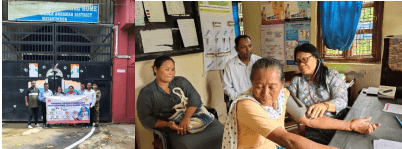A special Nikshay Shivir was organised under the TB Mukt Bharat Abhiyan at Sub-Centre, Webi and District Correctional Home in Mayabunder on Friday, focusing on raising awareness and identifying cases among vulnerable groups in remote parts of North and Middle Andaman. The event was conducted by the District TB Centre, Dr. R.P. Hospital, Mayabunder, with the presence of the District TB Officer, marking a step towards strengthening the fight against tuberculosis in the islands
The camp was designed to create awareness about the disease, its symptoms, and available government-supported treatment schemes. District Programme Coordinator Madhava Rao addressed the gathering on the importance of identifying symptoms early and ensuring timely medical intervention. He also explained schemes such as Nikshay Poshan Yojana, which supports nutritional needs of TB patients, and the Nikshay Mitra initiative, which encourages community support for those undergoing treatment. The session highlighted how tuberculosis remains a public health challenge but can be effectively managed through early detection and adherence to treatment protocols.
Alongside tuberculosis awareness, HIV prevention and treatment were also part of the outreach. HIV counsellor Sushanth Golder briefed the participants about preventive practices, testing, and treatment mechanisms, stressing the need for regular check-ups in at-risk populations. His address underscored the interconnectedness of TB and HIV, with both requiring proactive health-seeking behaviour and awareness campaigns to limit spread and ensure community health.
Following the awareness sessions, screening was conducted by District TB Officer Dr. Christina Rossity and Medical Officer (Ayurveda) Dr. Priyanka Iqbal, along with their medical team. The process included basic health checks and diagnostic referrals aimed at identifying early-stage cases. Out of the 35 individuals who participated across the two locations, 30 were marked as asymptomatic but vulnerable, and were referred to Dr. R.P. Hospital for chest X-rays and sputum examinations. These referrals ensure that latent or potential cases are not overlooked, reinforcing the principle of preventive vigilance that lies at the core of TB control strategies.
The initiative fits into the broader framework of the national TB Mukt Bharat Abhiyan, which aims for a TB-free India by 2025 through community-driven approaches, nutritional and medical support, and regular screening. For the remote communities of North and Middle Andaman, such camps provide essential health access and awareness that may not otherwise reach isolated populations. By focusing on groups such as those living in correctional facilities and rural sub-centres, the administration is also targeting environments where health vulnerabilities are often higher due to crowding and limited medical access.
Officials highlighted that active participation from the community remains critical to the campaign’s success. The Mayabunder event was part of a series of awareness and screening drives being carried out across the islands, aligning with national goals of eradicating the disease. The campaign emphasizes not only the role of medical professionals but also the importance of public participation, community-level vigilance, and destigmatising the disease.
With 30 individuals already referred for further tests from this single camp, the event underscores both the scale of vulnerability in rural areas and the effectiveness of early screening initiatives. The outcome will now depend on follow-up tests and ensuring that individuals diagnosed receive uninterrupted treatment and nutritional support through government schemes.
The Mayabunder Nikshay Shivir demonstrates how targeted interventions, combined with community awareness and government schemes, can bring remote populations into the national fight against tuberculosis. By combining TB awareness with HIV prevention, the camp highlighted a multi-pronged approach to tackling communicable diseases in vulnerable communities.
As TB remains one of the leading public health challenges globally and in India, such grassroots-level camps act as a reminder of the importance of sustained health interventions, especially in remote island communities. The Mayabunder initiative adds momentum to the mission of building a TB-free India and sets an example of how localised health drives can strengthen the country’s broader public health framework.





